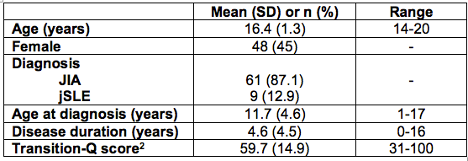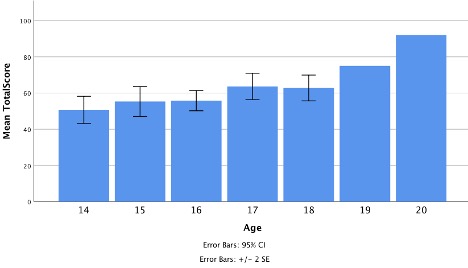Session Information
Date: Monday, November 9, 2020
Title: Pediatric Rheumatology – Clinical Poster III: SLE, Vasculitis, & JDM
Session Type: Poster Session D
Session Time: 9:00AM-11:00AM
Background/Purpose: Transitioning from pediatric to adult care represents a particularly vulnerable period among patients with JIA and jSLE. The shift to adult care is often unsuccessful, with patients being lost to follow-up or non-adherent to medications. Transition programs must support adolescents in acquiring and improving skills necessary to manage their own disease. Measuring patients’ current level of transition readiness is the first step in identifying areas for improvement in self-management skills and the transition process itself. Our objectives were to 1) examine variability in transition readiness using the Transition-Q in adolescents with JIA and jSLE; 2) determine the association between age and Transition-Q scores; and 3) identify areas that may be the biggest challenges to these adolescents.
Methods: Over a one-year period, patients 14-20 years of age with JIA or jSLE were recruited from transition and young adult clinics at a single academic institution. Participants completed the Transition-Q, a validated 14-item questionnaire which assesses healthcare self-management skills as a proxy for readiness to transition to adult care. Adolescents respond “never,” “sometimes,” or “always” to each question. Total scores range from 0-100; higher scores indicate greater transition readiness. Descriptive statistics summarized patient characteristics and Transition-Q scores. Differences in Transition-Q scores between sexes and diseases were explored using independent t-tests. Regression analyses determined the association between Transition-Q scores and age, controlling for sex and disease duration. Frequencies of responses to each question were determined.
Results: Of 70 participants (mean (SD) age 16.4 (1.3) years, 68.6% female), 61 had JIA and 9 had jSLE (Table 1). The mean (SD) Transition-Q score was 59.8 (14.9). Females had significantly higher mean total Transition-Q scores (62.3 (14.5)) compared to males (54.5 (14.9), p=0.043). The mean (SD) total Transition-Q score was 58.7 (15.2) amongst those with JIA and 67.9 (11.1) amongst those with jSLE (p= 0.105). Transition-Q scores significantly increased with age after accounting for sex and disease duration (standardized β=0.380, p=0.001) (Table 1). Most patients responded “never” to “I travel on my own to a doctor’s appointment” (82.9%), “I see the doctor or nurse on my own during an appointment” (60.0%), “I drop off or pick up prescriptions when I need medicine” (58.6%) and “I book my own doctor’s appointments” (58.6%).
Conclusion: This is the first study to use the Transition-Q to measure transition readiness in adolescent rheumatology patients. Transition readiness varied between and within age groups yet increased with age. Compared to males, females had higher total Transition-Q scores reflecting higher self-management skills. There was no difference in total Transition-Q scores between individuals with JIA compared to jSLE. Future work will examine the trajectory of changes in Transition-Q scores within patients over time, including after they transition to adult care. We will explore strategies to improve self-management skills and, subsequently, Transition-Q scores.
 Table 1 Baseline Characteristics (n=70)
Table 1 Baseline Characteristics (n=70)
 Figure 1 Mean Total Transition-Q Scores by Age
Figure 1 Mean Total Transition-Q Scores by Age
To cite this abstract in AMA style:
McColl J, Semalulu T, Alam A, Thomas S, Herrington J, Gorter J, Cellucci T, Garner S, Heale L, Matsos M, Beattie K, Batthish M. Ready or Not? Measuring Readiness for Transition to Adult Care in Adolescents with JIA & jSLE [abstract]. Arthritis Rheumatol. 2020; 72 (suppl 10). https://acrabstracts.org/abstract/ready-or-not-measuring-readiness-for-transition-to-adult-care-in-adolescents-with-jia-jsle/. Accessed .« Back to ACR Convergence 2020
ACR Meeting Abstracts - https://acrabstracts.org/abstract/ready-or-not-measuring-readiness-for-transition-to-adult-care-in-adolescents-with-jia-jsle/
